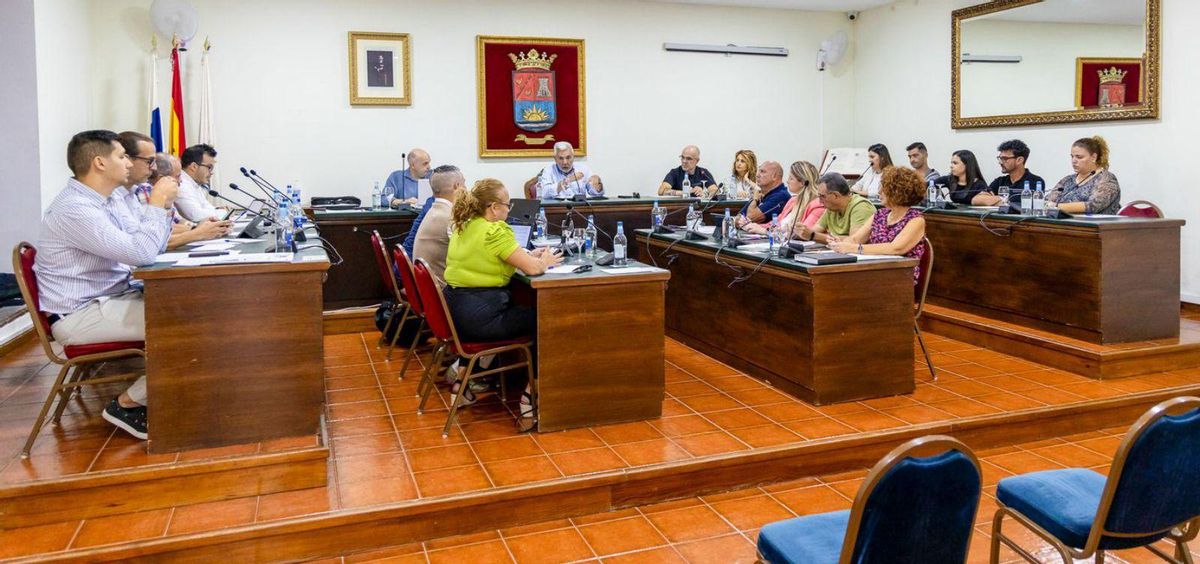The Adeje City Council concluded 2024 with a significant decision regarding two vital services: Waste collection and public sanitation. During the final plenary session of the year, an agreement was reached to initiate the administrative process for awarding the new contract for municipal waste collection and transportation, street cleaning, and maintenance of other public areas.
This will be conducted through an open procedure anticipated to be resolved in the first half of the upcoming year, thanks to a “thoroughly researched and detailed” list of stipulations, as stated by the Councillor for Good Governance and Municipal Services, Epifanio Díaz, who is overseeing the process. The proposal from the municipal government led by José Miguel Rodríguez Fraga proceeded with the supportive votes from the Socialist Party (PSOE), Canarian Coalition, and the Popular Party, alongside abstentions from Unidas Podemos and Vox.
From 171 to 209 employees
Among the most notable enhancements is the increase in the workforce by 38 professionals – rising from 171 to 209 – as well as the comprehensive expansion and renewal of the vehicle fleet, which will incorporate numerous hybrid and electric vehicles. The primary aim of this new contract is to elevate the quality of all associated services while expanding coverage and frequency. For instance, the household waste collection service, known as the grey container, will start operating seven days a week in the main residential areas and locations with higher residential or visitor density such as La Postura, the Adeje centre, and Costa Adeje. Furthermore, all modifications and enhancements will necessitate new methods of operation regarding sustainability and the protection and enhancement of jobs related to the contract, as highlighted by both the mayor and the councillor during the plenary session.
“This is one of the most crucial services that the municipality possesses, and we have always taken great care of it,” remarked the mayor of Adeje. “For us,” he emphasised, “it is vital that it operates effectively, efficiently, and meets the expectations of the community and the realities of an Adeje that continues to grow, calling for improved and more extensive cleaning services.” .

The final plenary session of the year that accepted the terms of the new cleaning and waste collection contract. / ED
Consequently, the cost of the contract will rise by nearly 30% “as we are striving for the highest possible quality without compromising the balance between costs to citizens, the quality we are aiming for, and the improvements that we understand are necessary and urgent,” Rodríguez Fraga emphasised.
The annual expenditure for the contract will surpass 10 million euros, and the technical requirements for companies wishing to enter the bidding include, in addition to extending services to seven days a week in the specified areas, exceptional measures during emergencies of any type, the maintenance of ravine channels in urban settings, algae cleaning on beaches, ditch clearing, and local road maintenance or the introduction of a unique system for cleaning roads and pavements, ensuring real-time removal of dirt and rubbish tailored to the specific characteristics of each neighbourhood in Adeje.
“The service needs to enhance”
The councillor in charge of Good Governance, who, along with the technical team, has been responsible for drafting the specifications and managing the process, clarified that with the new proposal, “we aim to address the cleaning issues that we acknowledge exist in the municipality,” and emphasised that the government group understands “the service must improve and that there are circumstances that demand correction; “That is the new major challenge, and we will persist until we accomplish it.”
The specifications also propose enhancing and optimising waste collection and cleaning routes, making them more efficient and effective, alongside the integration of new technologies to monitor potential service disruptions. All of this is framed within a sustainability initiative aimed at offsetting the carbon footprint while prioritising the introduction of a new fleet of vehicles that are more modern, environmentally friendly, and significantly more numerous than previously.
The authors of the document have diligently incorporated social and labour criteria aimed at preserving all jobs held by the current contractor, enhancing working conditions, and increasing the workforce by nearly 20% in the forthcoming years.
Another important aspect is the requirement for the development of new applications and technologies that will enhance and broaden communication channels with residents, as the feedback they provide about the service will be deemed critical for its improvement.















